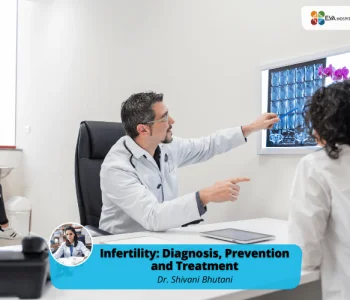 Eva Hospital
Eva Hospital
Infertility: Diagnosis, Prevention and Treatment
Introduction: An Infertility
If one is under 35 years of age and unable to get pregnant after having unprotected, regular sex for six months to one year, it can be a sign of infertility.
There are no definite symptoms of infertility. However, Women with infertility may sometimes have irregular or absent menstrual periods and some men with infertility may show signs of hormonal problems, such as changes in hair growth or sexual function.
The good news is that many safe and effective treatments are available nowadays and they can considerably improve the chances of pregnancy in couples who have been trying for a long time without success and a couple should immediately seek the consultation of a competent fertility specialist if they are facing issues in getting pregnant. The correct diagnosis and timely treatment can help couples in successfully achieving pregnancy.
When to See An Infertility Doctor?
Women Should Consult An Infertility Specialist if:
- They are 35 years or older of age and have been trying to get pregnant for six months or longer
- They have irregular or no periods
- Their periods are painful
- Have fertility problems they are aware of
- They have been diagnosed with endometriosis or a pelvic inflammatory disease
- They have a history of multiple miscarriages
- They have at some point in life undergone the treatment for cancer
Men Should Talk to An Infertility Doctor if:
- They have a low sperm count or other sperm-related issues.
- They have a history of testicular, prostate, or sexual issues, they are aware of or suspect
- Have at some point undergone treatment for cancer
- They have small testicles
- There has been a history of infertility problems in the family
How is Female Infertility Diagnosed?
The doctor may initially ask the couple to record the signs of ovulation. These signs include basal body temperature and cervical mucus.
There are a few tests that can also help diagnose infertility issues in females:
- Pelvic examination: A pelvic examination, including a Pap smear, is performed to check for any structural issues or signs of disease.
- Blood test: Blood tests can help to check hormone levels, including thyroid function tests.
- Transvaginal ultrasound: An ultrasound wand is inserted into the vagina to establish problems with the reproductive system if any.
- Hysteroscopy: A thin, lighted tube (hysteroscope) is inserted into the vagina by the doctor, to examine the uterus.
- Saline sonohysterogram (SIS): The uterus is filled with saline and transvaginal ultrasound is conducted.
- Hysterosalpingogram (HSG): An injectable dye performs an x-ray as it travels through the fallopian tubes, looking for blockages if any
- Laparoscopy: A laparoscope i.e. a thin tube with a camera is inserted into a small abdominal incision. The pelvic laparoscopy in females helps to identify issues like endometriosis, fibroids, and scar tissue.
How is Male Infertility Diagnosed?
The following tests can help diagnose infertility issues in males:
- Semen analysis: It helps to establish semen-related issues in men, such as low sperm count, poor morphology, and poor mobility. Needle biopsy is sometimes needed in some men to collect the sperm for testing from the testicles and this is the only test needed in the workup of infertility for most men.
- Blood test: Testosterone, thyroid, and other hormone levels are checked through a blood test. Genetic blood tests help find out chromosomal abnormalities.
- Scrotal ultrasound: Varicoceles or other testicular problems, if any can be identified with the help of the ultrasound of the scrotum.
Besides all these tests, the patient should listen to their body and inform the doctor if at any time they notice a sign or a symptom. The earlier an infertility problem is diagnosed, the more are the chances of getting pregnant.
How Can Infertility Be Prevented?
Some types of infertility are not preventable. However, many techniques may increase one’s chance of getting pregnant.
Following steps can be taken by both men and women to protect their fertility, particularly while trying to conceive:
- They must eat a well-balanced diet and maintain a healthy weight.
- They must avoid smoke, drugs, or excessive alcohol consumption.
- They must take treatment for STDs.
- The exposure to toxins must be limited.
- Physical activity is important but overdoing exercise must be avoided.
Additionally, the men must:
- Avoid high temperatures found in hot tubs and hot baths as they can have a temporary effect on sperm production and motility.
- Avoid exposure to industrial or environmental toxins as they can sometimes affect sperm production.
- Try to maintain a healthy weight as being both overweight and underweight can affect hormone production and cause infertility.
What Is The Treatment For Female Infertility?
The usual treatment for infertility in women include:
- Medications: Fertility drugs are prescribed to alter hormone levels to stimulate ovulation.
- Surgery: Blocked fallopian tubes can be opened and uterine fibroids and polyps can be removed through surgery. Surgical treatment of endometriosis can increase a woman’s chances of pregnancy by almost two times.
What Is The Treatment For Male-Related Infertility?
The recommended treatments for male infertility include:
- Medications: Testosterone or other hormone levels can be raised with the help.of medications. There are a few drugs that can help with erectile dysfunction.
- Surgery: Blockages in the tubes that store and carry sperm can be opened surgically.
Read More:Infertility: Types, Symptoms, and Causes
What Are The Fertility Treatment Options For All Genders?
Although the above prevention and treatments can help some couples to conceive successfully, others might need more treatment options to increase their odds of pregnancy. Some medications may be prescribed to women to stimulate ovulation, before trying one of the following options:
- Intrauterine insemination (IUI): A long, thin tube is used to place sperm directly into the uterus.
- In vitro fertilization (IVF): A kind of assisted reproductive technology, it implicates harvesting the eggs at the end of the stimulation and placing sperm and eggs together in a lab dish. These eggs are then fertilized by the sperm and one of the fertilized eggs (embryo) is placed into the uterus.
- Intracytoplasmic sperm injection (ICSI): In a procedure similar to IVF, a single sperm is directly injected into each of the harvested eggs by an embryologist and then an embryo is transferred into the uterus.
- Third-party ART: Donor eggs, donor sperm, or donor embryos are recommended to be used by Some couples may also need a gestational carrier or surrogate, who agrees to carry and deliver their baby.
Outlook For Couples With Infertility
Dr. Shivani Bhutani at Eva Hospital has been dealing with patients of both genders with infertility. She explains that almost 90% of couples succeed in getting pregnant after undergoing fertility treatments. However, the success rates of these treatments depend on the cause of infertility, the couple’s ages, and other aspects.
Although Infertility can pose many challenges and can sometimes affect relationships as well as emotional health, infertility treatments these days are proving highly successful in helping couples to eventually
start a family. An accurate diagnosis and appropriate treatment is the right step in this direction.
If you and your partner have been facing problems in conceiving despite trying for more than 6 months to a year, you may book an appointment here with Dr. Shivani Bhutani.
